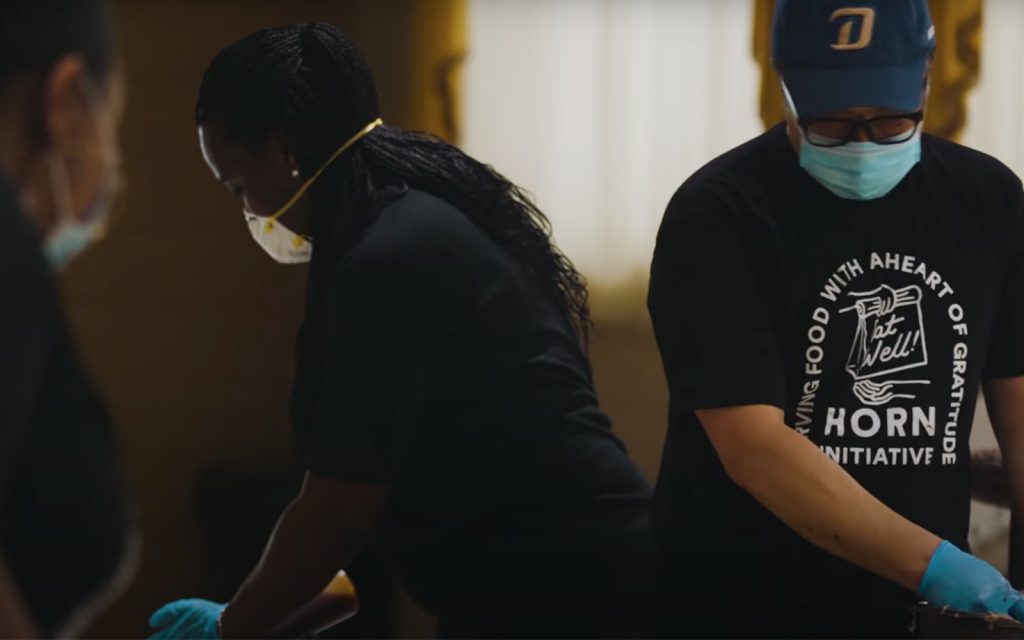Chef Matt Horn Previews His Soon-To-Open Oakland Spot, Horn Barbecue
Fresh off a collaboration, Horn discusses Black cooking in America, the importance of the proper tools, and more

Chef Matt Horn’s first foray into feeding the masses was at a farmer’s market in Tracy, California. In the years prior, he mastered BBQ—the techniques, timing, rubs, types of wood and beyond—in his spare time, in his grandmother’s backyard. By the time he was plating brisket, ribs, and the ilk, he was growing confident but admittedly unsure about launching at the market. He began to draw long queues and followed up successful weekend stints with one-off pop-ups around the Bay Area. A routine of announcing a pop-up, preparing for thousands (but silently worrying none would show) and then reveling in success continued until Horn established his first standalone space, Horn Barbecue in West Oakland, which opens for takeout soon and, sometime in the future, for dining in.

“I feel it’s extremely important to have one place that we call home,” Horn tells CH. “For years, I spent countless hours trying to figure out the next pop-up location, and in the midst of that, making sure all of the logistical planning was handled. It has definitely been a challenge for us, but by having a place to call home, it allows us to cook in the comfort of our own space. After dealing with so many setbacks on this journey, COVID-19 was one of those ‘This can’t be happening’ moments. I have always walked by faith in my life and with the current pandemic I had to remind myself that all things work together for the good. I had to believe that.”

In February, zoning issues pushed back Horn Barbecue’s launch for the foreseeable future. Then, the pandemic came. The restaurant team opted to feed workers at nearby hospitals. Horn umbrellaed the establishment’s efforts under the Horn Initiative, expanding its reach to more than 4,000 members of the Oakland community—including frontline workers in local hospitals. Donations flooded in to further the mission, which remained headquartered at the unopened Horn Barbecue location. Plus, Horn launched a collaborative sheet pan with CH favorite Made In and 100% of the proceeds were directed back to Horn Initiative. They sold out quickly, in close to an hour, but many more will be restocked next month as a pledge to Horn and his work.

“The partnership with Made In is a natural one for us. We are two enterprises who are pushing the edge of cooking,” Horn says. “We wanted a beautiful sheet pan to serve our food at the restaurant. Made In had been thinking about developing a new take on that common yet indispensable piece of cookware. We take a great deal of pride in the product that we serve our guests and Made In shares that same enthusiasm. This sheet pan represents us in so many different ways.”
Made In also outfitted the rest of Horn Barbecue’s kitchen, seeding pots, pans, knives, and whatever else was needed. The two formed a partnership over “shared approaches to cooking, innovation, and excellence,” Horn says. But the opening marks much more than the manifestation of a collaboration. For Horn, and Black chefs across the country, it’s a testament to how one’s commitment can make headway for others to follow. “I believe it is extremely important to be a Black chef, period,” Horn says. “The contribution of Black chefs and pit-masters are often over shadowed by the work of other chefs.”

Horn Barbecue’s location nods to the history of another Black-owned business, too: the former West Oakland location of Brown Sugar Kitchen, which Horn used to drive past on his way to his pop-ups. “The location of the restaurant is extremely important, especially being a Black-owned business in West Oakland. What makes it even more significant is the fact that our pop-ups draw thousands of hungry guests, no more than five minutes up the street in an old service station.”
He’s working to bring new business and retain loyal customers in a predominantly Black neighborhood in the Bay Area. It’s a neighborhood facing gentrification, but residents are hopeful it won’t be as extreme as in San Francisco—even as Square, the payment processing company, develops corporate offices seven minutes from Horn’s restaurant.

“I do believe that barbecue is the great unifier, one that has the ability to bring all people together for a collective purpose,” Horn says. “Our customers are beautiful people from all different cultural backgrounds, and we are grateful to have them in our lives. I believe barbecue tells a story of who we are, where we come from and also where we are going. America has a rich barbecue culture that tells the story of the unknown men and women who created this cuisine out of a sense of survival and despair. From that despair came a culture of live-fire cooking and low-smoked meats. There is always a story to tell.”

At the restaurant, especially through the dishes prepared there, Horn aims to tell these stories, but also further his own, as he hopes to establish a legacy. “I love smoking oxtails,” he says, explaining an item that—alongside his grandmother’s potatoes—will appear on Horn Barbecue’s menu when it opens to diners. “It’s a dish my mother cooked for me as a kid. I tried taking that dish and implementing smoke to enhance it. It is one of my all-time favorites dishes.”
Images courtesy of Matt Horn / Made In












